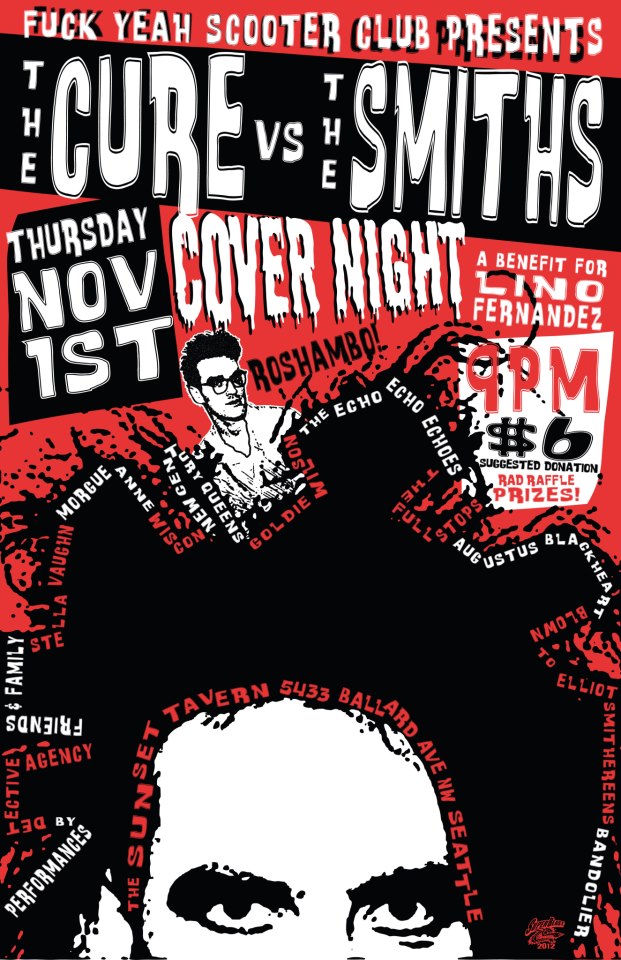 While one really doesn’t need a reason to celebrate Robert Smith and Morrissey, the sheer insanity of existence in Seattle Washington in 2012 has allowed a perfect cause. Lino Fernandez, a friend to quite a few in this town as the guitar player in Bandolier–a local band I have always admired for presenting a blend of tasteful vintage riff guitar work with indie pop and a certain R&B sensibility– has injured his ankle.
While one really doesn’t need a reason to celebrate Robert Smith and Morrissey, the sheer insanity of existence in Seattle Washington in 2012 has allowed a perfect cause. Lino Fernandez, a friend to quite a few in this town as the guitar player in Bandolier–a local band I have always admired for presenting a blend of tasteful vintage riff guitar work with indie pop and a certain R&B sensibility– has injured his ankle.
Somehow, Bandolier has not yet been covered in Ball of Wax. Their YELLOW EP is available for free at bandcamp here:
[wp_bandcamp_player type=”album” id=”3425513474″ size=”grande” bg_color=”#FFFFFF” link_color=”#4285BB”]
Okay, so because Lino’s injury occurred days before his medical insurance kicked in, he owes a staggering sum. Not to wallow in the politics of this, but if you go to an ER without insurance in Seattle, you will pay up to three times what the insured will pay for the same procedure. But it will be in a shiny new, extremely profitable ER. Here’s a brief Seattle Times article on the subject.What does one do when a friend is crippled and then placed in crippling debt? Sing songs for the infirm. The lineup for this event features the best of Seattle’s up-and-coming bands, including Friends and Family, whom I’ve already covered–and there’s a surprisingly good raffle going on.
And now to return to the songs that will be used to raise money for Lino and the environment that produced them. To support Lino, fantastic Seattle bands will be performing covers from two English bands of the Thatcher era that brought intelligence, complexity, and morality to rock music. Where I grew up, in an industrial town in Wisconsin, the music available before The Cure broke through (and brought The Smiths with them to local record stores), was sometimes one of the above, but never all three. There was a term called “progressive rock” but somehow that included Rush spouting off about the brilliance of Ayn Rand. We could turn to the Talking Heads or Lou Reed, but music from and about New York, while sometimes touching the same nerves, sounded . . . staged, or unnecessary elevated, falsely melodramatic. Lou Reed’s characters, like Hubert Selby Jr.’s, were self-destructive. David Byrne’s topic was modernity, something we never encountered in Racine, Wisconsin. (We started at nowhere, so worrying that we weren’t getting anywhere wasn’t on the radar.) But Jesus, for a child surrounded by working class Irish Catholic relatives, to pop the cassette The Queen Is Dead into a boom box and hear a song like “Vicar in a Tutu,” or even “Frankly Mr. Shankly,” acknowledging theft, perversion, and faith in stories that always felt vaguely like an aside, it all pointed to a truth that in my closed, middle of nowhere world, there was a deeper lyricism available.
All that said, I have since been to Morrissey’s Manchester (I’ve never been to Robert Smith’s West Sussex). I found it to be an unusually nihilistic, violently thuggish community (things may have changed since 1997). I am now aware that the great British music that is the foundation for indie rock was created in an oppressive, stifling, and often flat-out ugly environment. This somewhat builds my appreciation even more, and it leads to certain unavoidable conclusions about great artists from outside of the United States. Artists who develop past the age of 17 and take on intellectually complex topics. Artists who aren’t born into wealth. There is one thing so many of these artists have that American artists do not have: access to fucking healthcare without guaranteed bankruptcy.
The Cure vs. The Smiths will take place on November 1st at the Sunset Tavern, 5433 Ballard Ave NW. Suggested donation is $6. Here’s the lineup:
Wiscon
New Century Queens
Friends and Family
Detective Agency
The Echo Echo Echoes
Bandolier
Blown to Elliott Smithereens
Morgue Anne and Stella Vaughn
The Full Stops
Augustus Blackheart
Blake Madden (Hotels)
By the way, the Sunset Tavern is pretty much in the shadows of a shiny new Swedish ER facility.
